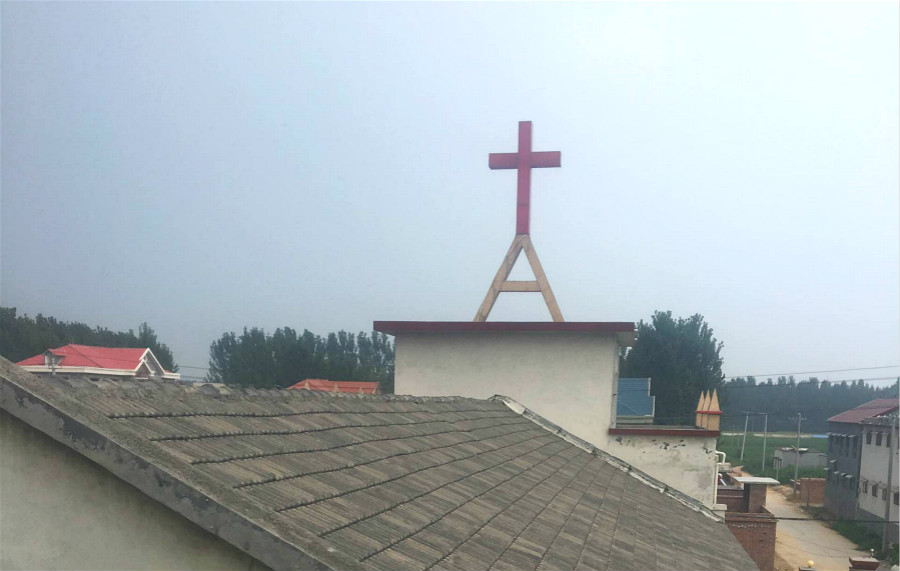The book "Rethinking the Churches of Henan" mentions the great revival in Henan last century. Back then the churches in Henan radiated from Nanyang, and any preachers were sent out to Xinjiang, Inner Mongolia, Hainan, Heilongjiang, Yunnan, Guizhou, Sichuan, and many other places to start new churches. Henan was called "the Chinese Jerusalem" at the time. The book also indicates that although the churches in Henan suffered serious persecution, it only made the churches under persecution stronger, and a wave of enthusiasm for evangelism swept over other places.
But since the 2010s, under the influence of an "Urban Worker Migration", numerous rural workers went to the cities in the Southeast to work and many congregations and preachers in Henan also took advantage of the migration and started working and doing business in the cities while the churches in their hometowns have declined. Recently, ChinaChristianDaily(CCD) visited the churches in Henan and saw many churches and its preachers under multiple pressures from finance, serving and living. Indeed, due to various reasons, compared to the booming time of many churches today, the Henan Churches nowadays seem slow in development and even stopped growing. But there are still people with God's purpose and His loyal servant.
Born in Henan, Pastor Wang is now 45 years old and has been serving here for 20 years. Pastor Wang witnessed the revival time in Henan and Anhui churches decades ago and experienced the impact of the "Urban Worker Migration." He has some personal experience and feelings toward the challenges facing the rural churches under this circumstance; He also serves in this reality and starts many services with other clergy, such as taking care of the left-behind elders, helping women, and rural relief which are in great need right now. CCD invited Pastor Wang to share some challenges facing the rural churches experienced under the "Urban Worker Migration."
The Serving Experience of Pastor Wang
When he first became a Christian, he participated in the local fellow worker training for three years with a job. Back then, he just returned to his county and noticed there was no fellow worker training program and the church was facing "Three Limits": limited preachers, limited service time and limited study time. He put great effort in the fellow worker training. Nevertheless, he never thought about becoming a full time pastor.
One year after the Spring Festival, he returned to his hometown from another place and went to a church. There happen to be no preacher that day with the whole congregation waiting, so Pastor Wang had to do something about it. He went to the stage and shared briefly. A church elder was sitting there listening to him the whole time, asking where Pastor Wang was from as soon as he finished sharing. Pastor Wang answered the question, and then the elder explained the situation and needs of the rural fellowships. Pastor Wang put this in his prayer with a helping heart, but gradually God put the "Serving Church" in his heart.
Pastor Wang said he wanted to go to two places at the time: Guizhou and Henan. But after his ten-day field trip in Guizhou, he found that he couldn't adapt to the life and environment, so he returned to his hometown in Henan to serve.
When he first started, he contacted the church elder for training cooperation and he carried on with the good results for three years. When the training started, they asked for help from the local Three-self church. Back then the Three-self churches and house churches would cooperate occasionally, but over time, there was disharmony between the two parties and, as a result, they had to stop the cooperation. Pastor Wang had to retreat himself from it and ask help from another house church.
Fellow-Worker Training is Very Important to the Development of the Rural Churches
At first, all of Pastor Wang's focus was on the training. By the third year, the migration divided the young congregation in the rural church into two parts: one with the young believers, including the seminary students, joining the migration to start working in the cities after the training where the local church would use them when they found their gifts, such as praying. The other group stayed in the country since they had children and served while farming or doing some small business to reduce the family's economic pressure.
In the country, from preachers to congregation, they all had to serve while working. Every year from June to July and September to October was the busiest. Even the young migrant workers would return home with a leave and help with the sowing and harvesting. After the busy season, people would return to their normal routines with working and doing business.
The busy season was staggered as well as the evangelism. According to Pastor Wang, from the first to the fifteenth of January on the lunar calendar is the best time to spread to gospel. The rural churches would organize some preaching activities with their own band they go to every village to perform and preach and call for new believers. Afterward, there would be the fellow worker training, and they would gather all the people in charge of the nearby churches for a general study followed by a three-day gathering in each church and team up the fellow workers after the training to train the congregation.
Pastor Wang believes that the fellow worker training is very important: only with the healthy spirits of the fellow workers can we have the spiritual growth of the congregation. Therefore, aside from fellow worker training, Pastor Wang is making great efforts to promote teacher training, choir training and youth training.
Pastor Wang didn't mince his words, saying the current challenge facing the church is mainly understaffing, with everyone working in the cities. The church needs workers; however, most people work in the cities, and very few stay and serve the church; the help from outside is mainly spiritual and educational, barely any staff. For years, the church has been working on the understaffing problem.
He can only come up with two ways, one being to contact all the former students who have studied in the church and let them know the burden of the church hoping that they might contribute something to the church and the other being to encourage the local brothers and sisters to take more time out of their business to help the church and the fellow workers in need.
The Tension between Urban Church and Rural Church Needs Balance
When it comes to the current problems facing the church, Pastor Wang told us that there was a catch word, "Urban Mission," a few years back that caused many people to go to the cities while the hometown churches were neglected. The situation is the same with people (young people) preaching in cities instead of rural churches. The main reasons are that it's easier for the people in the cities to understand the sermon compared to the elders in the rural churches. Urban churches have more funds while the funds cannot keep up in the rural areas.
Therefore the urban and rural churches need to coordinate with each other. Pastor Wang said the offering can't keep up with the mission work from the urban churches. Most of the offering is from the rural areas or tithes and communions, and they will be adequately financed with one big offering. Only the elders in the rural areas do not want to donate because they believe they do not benefit from the rural churches that are doing mission work in the cities. For the same reason, because these churches focus more on the cities, they are experiencing financial shortages. Due to the lack of pastoral care or donations, both the urban and rural churches are in an endless loop.
The old, Middle-Aged, and Young Work Together
Furthermore, the older generations have the false notion about donations. They believe that God will provide for the preachers and seminary students without the actual donations. Hence a serious collision aroused between the two generations. Aside from the donations, they have disagreements on other things, such as the older generation values money while the new generation values outcome; when shopping for groceries, the older generation values low prices while the new generation values quality. All in all, people from different generations working together matters to the church reformation.
Pastor Wang also mentioned an old concept, "Poor Mission," which means a poor environment helps preaching. So when they first started the training programs and there was no chair, the students would eat what others don't want and had to sleep in a dorm room. They understand now that it was wrong. Later on, God provides a house and quilts and the environment gets better little by little. With the development of the society, if the church environment is too bad, even though we have the training program, the young people would not want to come.
Pastor Wang also made some brief comments on what the church is doing at the moment.
On one hand, the rural churches can't relax and stop on the evangelism and pastoral care because these are the fundamental mission of the church and matters of salvation. On the other hand, with the "Urban Worker Migration," the church can't turn a blind eye on the left behind elders, children and women. We need to pay visits and help them in order to put the gospel into practice.
Evangelism and Preaching
God opened a wide door for the church when it comes to evangelism and preaching. There is a custom of temple fairs in the rural areas attracting many people with singing and dancing. Every year at this time, the church will also build stages to perform some Christian acts. Sometimes it will attract over 2000 people to come and watch. Those people had no idea that they were spreading the Good News, and only after the preacher finished the sermon and call did they realize they were Christians and they would accept too.
The most common method of evangelism is for non believers go to church with their relatives and neighbors who are Christians, they are provided with free fruits and food and this works very well. Sometimes, the stage even is not big enough for people who converted that day.
Pastoral Care Follow-Up
The church will give the new believers a card to write their names, addresses and phone numbers and other information and then send these cards to the experienced believers so that they can keep visiting and follow up.
Left-Behind Children Care
The Sunday schools meet with unfailing regularity with summer and winter camps to give the children academic and spiritual cultivation. During the camps, the church would provide accommodation and all the children need to do is to be happy and grow up. If the fellow workers' children want to continue studying after the training in church, the church would help them to study and equip themselves in better places.
Care for Empty Nest Elderly
What the church does for the empty nest elderly is spiritual guidance and other help given their circumstances with each village selecting a leader. The individual problems are presented to the leader and the leader then informs the church.
Care for Middle Aged Women
Many rural middle aged women with their husbands working in different places suffer great pressure spiritually and from life. The church provides marriage counseling and other help and encourages them to unite with their husbands with their kids during vacation, even though it costs money, but it is important for a family to spend some time together.











